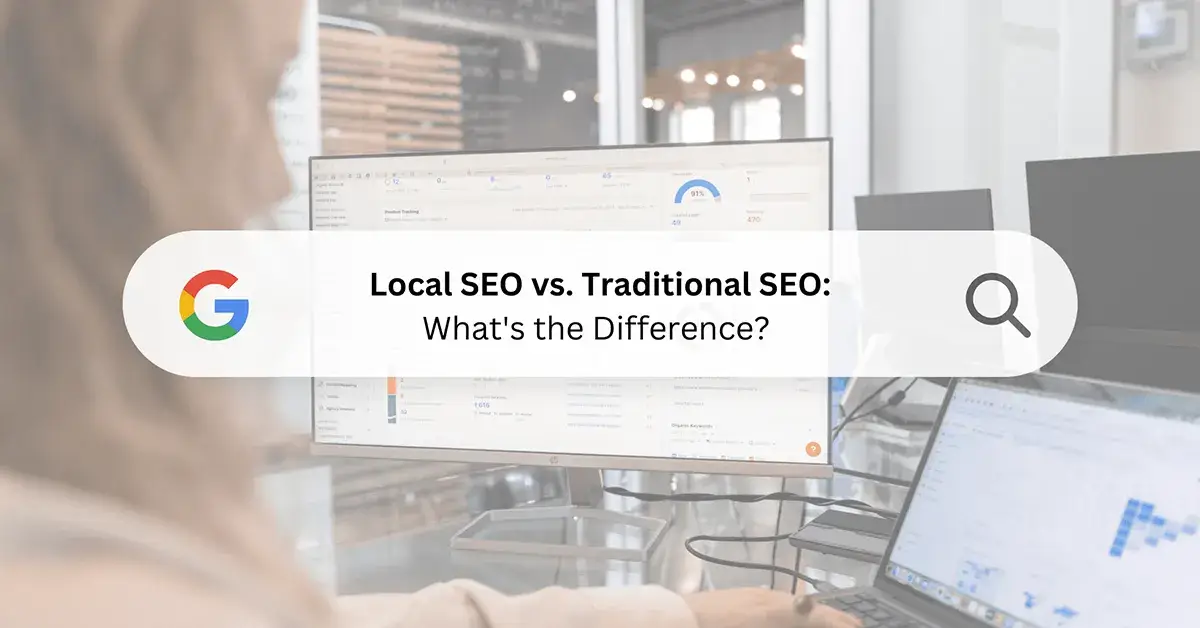

When it comes to search engine optimization (SEO), there are two primary approaches: local SEO and traditional SEO. Both are aimed at improving a website’s visibility in search engine results pages (SERPs) and driving more traffic to the site. There are some key differences between the two that are worth exploring. In this blog post, we’ll take a closer look at local SEO vs. traditional SEO and what sets them apart.
First, let’s define what we mean by local SEO and traditional SEO. Local SEO is the process of optimizing a website for local search queries. The goal of local SEO is to appear in the “local pack” or “map pack”. Map pack refers to the results that show at the top of Google’s search results for certain types of queries. Traditional SEO, on the other hand, is the process of optimizing a website for broader, more generic search queries. The goal of Traditional SEO is to rank as high as possible in the organic search results.
Let’s take a closer look at the main differences between the two, and how SEO companies in Texas use these strategies to boost rankings on SERPs.
One of the biggest differences between local SEO and traditional SEO is the type of keywords that are targeted. Local SEO tends to focus on geo-specific keywords, such as “keyword + city” or “keyword + state,” while traditional SEO targets more general keywords that are not location-specific.
Local SEO is a specialized subset of traditional SEO that targets specific geographic areas, such as cities, towns, or regions. Local businesses, such as restaurants, hair salons, and pet stores, rely heavily on local SEO to attract nearby customers who are searching for their services online.
In local SEO, the primary focus is on geo-specific keywords that include the name of a city, town, or region. For instance, if you own a pizza restaurant in Texas, your local SEO campaign would aim to target keywords that include the name of the city or area where your restaurant is located. Examples of such keywords could be “best pizza delivery in Austin,” “top-rated pizza restaurant in Houston,” or “affordable pizza place in San Antonio.” By targeting such keywords, your business can increase its visibility in local search results and attract more local customers.
Traditional SEO campaigns target more general keywords that are not location-specific. These keywords are usually broad and aim to attract a larger audience. For example, if you own a pizza restaurant in Texas, your traditional SEO campaign might target keywords like “best pizza in the US,” “pizza delivery near me,” or “authentic Italian pizza.” By targeting such keywords, your business can reach a wider audience, including customers who may be searching for pizza-related information but are not located in your immediate area.
Another key difference between local SEO and traditional SEO is the content strategy. Local SEO campaigns often focus on creating location-specific content, such as blog posts about local events or landmarks. Traditional SEO campaigns, on the other hand, focus on creating high-quality, informative content that appeals to a broader audience.
In local SEO campaigns, SEO agencies focus on creating location-specific content that appeals to customers in a specific geographic area. For example, a real estate company in Dallas might create blog posts about the local housing market, including trends, news, and statistics related to the city. The company might also create content that provides tips and advice for buying or selling a home in Dallas, including information about local schools, neighborhoods, and amenities. By creating such content, the company can establish itself as a local expert and build trust with its target audience.
In contrast, traditional SEO services focus on creating high-quality, informative content that appeals to a broader audience. Such content might include comprehensive guides on topics like “how to buy a house” or “how to sell your home.” The goal of this content is to provide valuable information to a large audience, positioning the company as an expert in the industry and driving traffic to its website.
Another key difference between local and traditional SEO content is the use of keywords. Local SEO campaigns often incorporate location-specific keywords, such as the name of the city or neighborhood, into the content to increase visibility in local search results. Traditional SEO campaigns, however, use broader keywords that are not location-specific, aiming to rank higher in search results for a larger audience.
Link building is a crucial aspect of SEO that involves acquiring backlinks from other websites to your site. It helps search engines recognize your site as a trusted source of information and increase your site’s visibility in search results. However, the approach to link building can differ depending on the type of SEO campaign being executed.
In a local SEO service, the focus is on optimizing a website for a specific location. Local SEO link building strategies aim to increase the number of backlinks from local directories or websites to a business’s website. These links from local directories help search engines understand that the website is relevant to the local audience, thus improving its local search engine rankings. Local SEO campaigns may involve building links from sources such as local chamber of commerce websites, local business directories, and review sites like Yelp or Google My Business.
On the other hand, traditional SEO services aim to increase a website’s visibility in search engine results pages (SERPs) for relevant keywords, regardless of the geographic location. Traditional SEO link building strategies focus on building links from high-authority websites in the same industry or niche. The idea is to get links from websites with high domain authority and page authority. These links help to increase the site’s trust and authority, which in turn, improves the site’s visibility in the SERPs. For instance, a traditional SEO campaign for a yoga studio might involve building links from authoritative yoga websites, health and wellness blogs, or even news outlets.
The approach to link building in SEO campaigns can differ depending on the campaign’s objective. While local SEO often focuses on building links from local directories, traditional SEO campaigns may focus on building links from high-authority websites in the same industry or niche.
Reviews and reputation management are important aspects of local SEO that can greatly impact a business’s online visibility and reputation. Local businesses rely heavily on customer reviews to attract new customers and build trust with their existing customer base. When potential customers search for a local business, they often look for reviews and ratings to gauge the quality of the business’s products or services. As a result, local SEO campaigns often focus on encouraging customers to leave reviews on platforms like Yelp or Google My Business, as these reviews can improve a business’s visibility in local search results and influence potential customers’ decisions to patronize the business.
Local SEO campaigns also prioritize responding to those reviews in a timely and professional manner. Responding to reviews shows that the business values its customers’ feedback and is committed to providing excellent customer service. Responding to negative reviews in particular is crucial, as it provides an opportunity to address any issues and demonstrate a willingness to rectify the situation.
While reputation management is still important in traditional SEO campaigns, the focus is usually on building brand awareness and establishing the website as a trusted authority in its niche. Traditional SEO campaigns may prioritize building backlinks from high-authority websites, creating high-quality content, and engaging with social media followers to improve the website’s overall online reputation. While customer reviews may not be as crucial in traditional SEO, positive reviews can still help to build trust and authority for the website and improve its overall online reputation.
Reviews and reputation management are critical components of local SEO campaigns and should be a part of your digital marketing strategy. Encouraging customers to leave reviews and responding to those reviews in a timely and professional manner can greatly impact a business’s online visibility and reputation. While reputation management is still important in traditional SEO, the focus is usually on building brand awareness and establishing the website as a trusted authority in its niche.
Local SEO focuses on optimizing a website for a specific geographic location and building a strong online presence in the local community. The primary goal of local SEO is to improve the visibility of a business in local search results and attract more local customers. The tactics used in local SEO campaigns include optimizing the website for local keywords, building local citations and backlinks, and managing customer reviews and reputation.
Traditional SEO, on the other hand, focuses on optimizing a website for broader search queries and building authority in a specific niche or industry. The primary goal of traditional SEO is to improve the overall visibility of a website in search results and attract a larger audience. The tactics used in traditional SEO campaigns include building high-quality backlinks from authoritative websites, optimizing the website’s content for relevant keywords, and improving user experience on the website.
The choice between local SEO and traditional SEO will depend on the specific goals of your business and the audience you are targeting. If you are a local business looking to improve your visibility in local search results, then local SEO may be the best approach for you. If you are a national or international business looking to build authority in your industry, then traditional SEO may be a better fit. Hiring a digital marketing agency in Texas can best optimize your website for the SERPs.
Understanding the differences between local SEO and traditional SEO is essential to creating an effective search engine optimization strategy for your business. By focusing on the right tactics for your business and target audience, you can improve your website’s visibility in search results and attract more customers to your business.
Does keeping up with your company’s SEO seem like a daunting task? Hire SEO Company in Texas, Kreative Media. At Kreative Media we level up your digital marketing through search engine optimization and search engine marketing. Our services range from social media management to website development and photography & videography. Contact us today to let an award-winning agency tell your story.